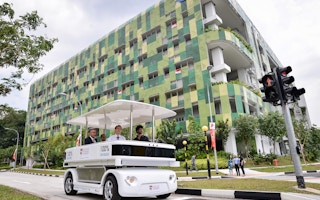Singapore on Friday launched the first eco-friendly, driverless shuttle in Asia, giving a boost to the electric mobility industry.
To continue reading, subscribe to Eco‑Business.
There's something for everyone. We offer a range of subscription plans.
- Access our stories and receive our Insights Weekly newsletter with the free EB Member plan.
- Unlock unlimited access to our content and archive with EB Circle.
- Publish your content with EB Premium.
The Singapore Economic Development Board (EDB), Nanyang Technological University (NTU), and JTC Corporation of Singapore, with France’s Induct Technologies, unveiled ‘NAVIA’, an autonomous vehicle providing a new means of transportation for people going to the university and JTC’s CleanTech Park.
The eco-business park by industrial developer JTC recently opened its doors at CleanTech One, its first facility that promotes collaboration and innovation in clean technologies.
Induct Technologies, a tenant in CleanTech One, manufactured the shuttle while the different organisations each contributed their scientific, technical and financial support.
In a joint statement, they said the Energy Research Institute @ NTU, or ERI@N, will supervise NAVIA’s two-year test run.
Covering two kilometres between its two main destinations, NAVIA will be able to carry eight passengers at a time. The shuttle, with a maximum speed of 20.1 kilometres per hour, will be programmed with intelligence systems and software that will guide it on its pre-determined path.
During the trial period, ERI@N will review the vehicle’s ability to safely manoeuvre between traffic in Singapore. The research group will also work with Induct to further improve the transport’s electric battery, increasing its energy efficiency and charging speeds and testing new charging technologies like wireless induction and super capacitors.
With this feasibility study, Singapore could set the example of integrating autonomous vehicles into a nationwide transport network, addressing the ‘first mile, last mile’ syndrome or the usual bottlenecks plaguing urban trips, said the partner organisations.
The ‘first mile, last mile’ problem is the difficulty of getting people to a transport hub from their first destination or from the transport station to their home. Also applied to the challenge of transfering goods in supply chain logistics, this initial and final phases are riddled with inefficiency and added costs.
Last year, the nation invested $5.4 billion in public transportation and road infrastructure alone, and this year, $5.8 billion is the estimated spending, according to the Ministry of Transport.
Part of the government’s development programme is ensuring it becomes sustainable and efficient through their Energy Efficient Singapore or E2PO Initiative. Based on data from the National Environment Agency, the transport sector accounts for 15.8 per cent of fuel consumption in Singapore, next to power generation and the industrial sectors.
ERI@N executive director and professor Subodh Mhaisalkar said: “Leveraging on NTU’s expertise in engineering and clean energy, we are confident that our partnership with Induct will see us explore breakthroughs in autonomous driving, wireless fast charging, and advanced battery technologies for sustainable transportation solutions.”
“The planned route between JTC’s CleanTech One and the NTU campus represents a real world scenario of shuttling passengers within a short range, with varying topography and pre-defined routes,” added Pierre Lefevre, chief executive officer of Induct.
Singapore Economic Development Board assistant managing director Julian Ho added, “We are pleased that Induct and NTU are embarking on an electric autonomous vehicle test bed in Singapore. Autonomous vehicles, alongside electric vehicles, represent new growth opportunities that will allow Singapore to build systems-level capabilities such as intelligent sensors and charging solutions.”










